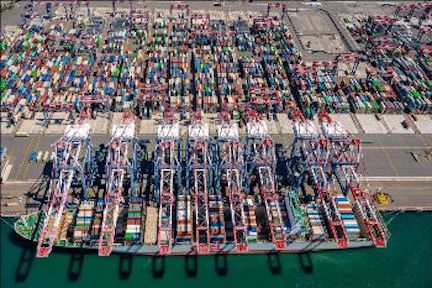Cargo shipments rose at the Port of Long Beach in May as the economic effects of COVID-19 started to subside.

Dockworkers and terminal operators moved 628,205 twenty-foot equivalent units (TEUs) of container cargo last month, a 9.5% increase from May 2019. Imports grew 7.6% to 312,590 TEUs, while exports climbed 11.6% to 134,556 TEUs. Empty containers headed back overseas jumped 11.4% to 181,060 TEUs.
The Port has moved 2,830,855 TEUs during the first five months of 2020, 5.9% down from the same period in 2019.
“Our strong numbers reflect the efforts of our Business Recovery Task Force, which is setting the path for efficient cargo movement and growth,” said Mario Cordero, Executive Director of the Port of Long Beach. “Our focus on operational excellence and world-class customer service will continue as we prioritize our industry-leading infrastructure development projects.”
“We aren’t out of the woods, but this is the gradual growth we have anticipated as the United States starts to rebound from the devastating economic impacts of COVID-19 and the trade war with China,” said Long Beach Harbor Commission President Bonnie Lowenthal.
As part of its recovery efforts, the Port of Long Beach has activated an internal Business Recovery Task Force that works with customers, industry partners, labor and government agencies to ensure terminal and supply chain operations continue without disruption, along with expediting shipments of crucial personal protective equipment.
May marked the first month in 2020 that cargo shipments rose at the nation’s second-busiest port, and followed seven consecutive months of declines attributed to the U.S.-China trade dispute and the COVID-19 epidemic.
Manufacturing in China continues to rebound from the effects of COVID-19, while demand for furniture, digital products and home improvement goods is increasing in the United States.











